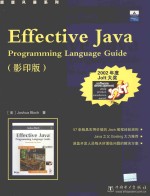图书介绍
effectivejava影印版PDF|Epub|txt|kindle电子书版本网盘下载

- 著
- 出版社:
- ISBN:
- 出版时间:未知
- 标注页数:0页
- 文件大小:31MB
- 文件页数:267页
- 主题词:
PDF下载
下载说明
effectivejava影印版PDF格式电子书版下载
下载的文件为RAR压缩包。需要使用解压软件进行解压得到PDF格式图书。建议使用BT下载工具Free Download Manager进行下载,简称FDM(免费,没有广告,支持多平台)。本站资源全部打包为BT种子。所以需要使用专业的BT下载软件进行下载。如BitComet qBittorrent uTorrent等BT下载工具。迅雷目前由于本站不是热门资源。不推荐使用!后期资源热门了。安装了迅雷也可以迅雷进行下载!
(文件页数 要大于 标注页数,上中下等多册电子书除外)
注意:本站所有压缩包均有解压码: 点击下载压缩包解压工具
图书目录
1 Introduction1
2 Creating and Destroying Objects5
Item 1: Consider providing static factory methods instead of constructors5
Item 2: Enforce the singleton property with a private constructor10
Item 3: Enforce noninstantiability with a private constructor12
Item 4: Avoid creating duplicate objects13
Item 5: Eliminate obsolete object references17
Item 6: Avoid finalizers20
3 Methods Common to All Objects25
Item 7: Obey the general contract when overriding equals25
Item 8: Always override hashCode when you override equals36
Item 9: Always override to String42
Item 10: Override clone judiciously45
Item 11: Consider implementing Comparable53
4 Classes and Interfaces59
Item 12: Minimize the accessibility of classes and members59
Item 13: Favor immutability63
Item 14: Favor composition over inheritance71
Item 15: Design and document for inheritance or else prohibit it78
Item 16: Prefer interfaces to abstract classes84
Item 17: Use interfaces only to define types89
Item 18: Favor static member classes over nonstatic91
5 Substitutes for C Constructs97
Item 19: Replace structures with classes97
Item 20: Replace unions with class hierarchies100
Item 21: Replace enum constructs with classes104
Item 22: Replace function pointers with classes and interfaces115
6 Methods119
Item 23: Check parameters for validity119
Item 24: Make defensive copies when needed122
Item 25: Design method signatures carefully126
Item 26: Use overloading judiciously128
Item 27: Return zero-length arrays, not nulls134
Item 28: Write doc comments for all exposed API elements136
7 General Programming141
Item 29: Minimize the scope of local variables141
Item 30: Know and use the libraries145
Item 31: Avoid float and double if exact answers are required149
Item 32: Avoid strings where other types are more appropriate152
Item 33: Beware the performance of string concatenation155
Item 34: Refer to objects by their interfaces156
Item 35: Prefer interfaces to reflection158
Item 36: Use native methods judiciously161
Item 37: Optimize judiciously162
Item 38: Adhere to generally accepted naming conventions165
8 Exceptions169
Item 39: Use exceptions only for exceptional conditions169
Item 40: Use checked exceptions for recoverable conditions and run-time exceptions for programming errors172
Item 41: Avoid unnecessary use of checked exceptions174
Item 42: Favor the use of standard exceptions176
Item 43: Throw exceptions appropriate to the abstraction178
Item 44: Document all exceptions thrown by each method181
Item 45: Include failure-capture information in detail messages183
Item 46: Strive for failure atomicity185
Item 47: Don't ignore exceptions187
9 Threads189
Item 48: Synchronize access to shared mutable data189
Item 49: Avoid excessive synchronization196
Item 50: Never invoke wait outside a loop201
Item 51: Don't depend on the thread scheduler204
Item 52: Document thread safety208
Item 53: Avoid thread groups211
10 Serialization213
Item 54: Implement Seriali zable judiciously213
Item 55: Consider using a custom serialized form218
Item 56: Write readobj ect methods defensively224
Item 57: Provide a readResol ve method when necessary230
References233
Index of Patterns and Idioms239
Index241